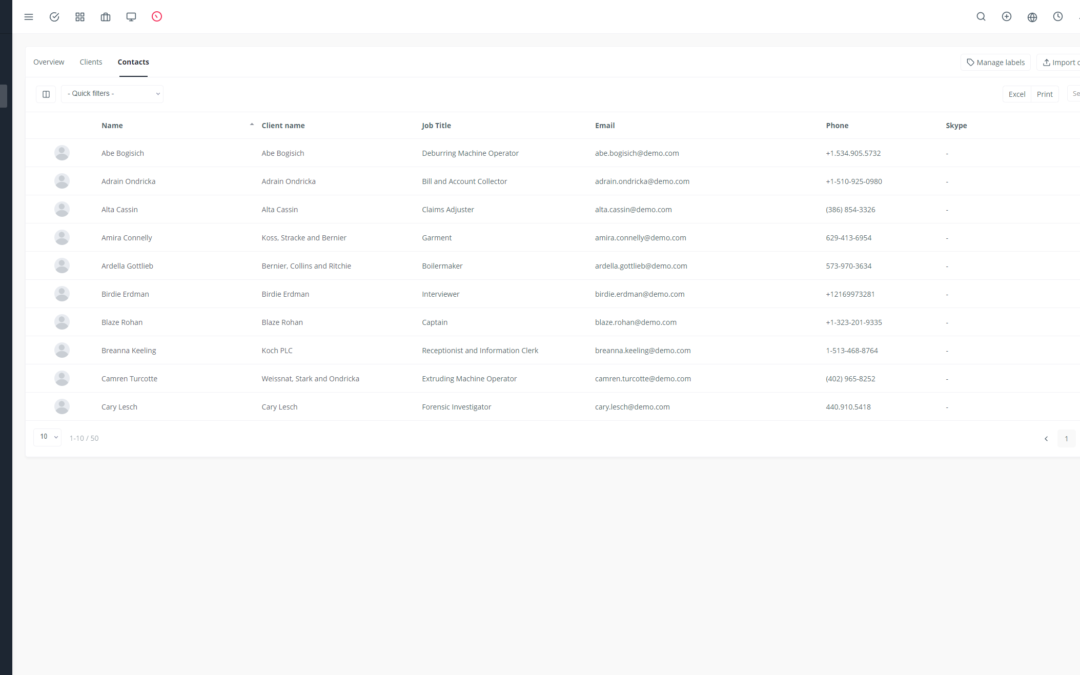Introduction
In the ever-evolving marketing landscape, agencies need to find ways to optimize their performance and retain clients. The answer? CRM (Customer Relationship Management). A CRM is more than just a contact management tool; it’s a true ally for marketing agencies, enabling them to strengthen client relationships, improve campaigns, and increase profitability.
1. What is a CRM?
A CRM is software that allows you to centralize and manage all interactions with your clients, whether they are prospects, existing customers, or partners. Imagine a comprehensive dashboard that brings together key information about each client, their interactions with your agency, their preferences, and their purchase history. This is the heart of the CRM!
2. The Benefits of a CRM for Marketing Agencies
Integrating a CRM into your agency offers a range of significant advantages:
Improved communication and collaboration: No more scattered information in different files! CRM centralizes everything, allowing teams to have a holistic view and collaborate effectively.
Better understanding of clients: CRM collects valuable information about your clients, enabling you to tailor your marketing strategies to their specific needs.
Automation of repetitive tasks: Say goodbye to time-consuming manual tasks! CRM automates processes such as sending marketing emails, following up on leads, and scheduling appointments, freeing up time for more strategic tasks.
Improved marketing campaigns: CRM allows you to optimize your campaigns by segmenting your clients, personalizing messages, and tracking the effectiveness of each action.
Increased customer satisfaction: Personalized and proactive customer service based on CRM information strengthens your client loyalty and satisfaction.
3. How CRM Can Help Manage Client Relationships
CRM is an essential tool for effectively managing client relationships. Here’s how:
Manage contacts and client information: CRM centralizes your client information, allowing you to segment them and adapt your communications to their needs.
Create detailed client profiles: By enriching client information with demographics, interests, and interactions, you create comprehensive profiles, allowing you to better understand their motivations and needs.
Lead and opportunity management: CRM helps you track leads, qualify them, assign them to teams, and convert them into clients.
Sales pipeline management: Visualize the progress of each sales opportunity through the pipeline, identify roadblocks, and optimize the customer journey.
4. How CRM Can Enhance Marketing Campaigns
CRM is a major asset in optimizing your marketing campaigns. It allows you to:
Client segmentation and targeting: CRM enables you to segment your clients based on their characteristics, behaviors, and preferences to deliver relevant marketing messages.
Message personalization: By leveraging information gathered in CRM, you can personalize marketing messages based on each client’s needs and interests.
Campaign tracking and analysis: CRM provides valuable data on the effectiveness of your campaigns, enabling you to track open rates, click-through rates, and conversions, and adjust your strategies accordingly.
5. Key CRM Features for Marketing Agencies
A powerful CRM for marketing agencies should offer a set of key features:
Integration with other marketing tools: CRM should easily integrate with your existing marketing tools, such as email platforms, web analytics tools, and social media platforms.
Task automation: CRM automates repetitive and time-consuming tasks, allowing you to save time and improve your productivity.
Analytics and reporting: CRM provides comprehensive analytics and reporting tools, allowing you to track your campaign performance and measure your return on investment.
Lead and opportunity management: CRM helps you effectively manage leads, convert them into clients, and track the progress of sales opportunities.
6. Choosing the Right CRM for Your Agency
Selecting the right CRM is crucial for the success of your marketing strategy. Consider the following criteria:
Size and type of your agency: CRM should be tailored to the size of your agency and the complexity of your operations.
Budget: Set a realistic budget for purchasing and implementing CRM.
Features: Ensure that CRM offers the features you need, such as task automation, data analysis, and integration with other marketing tools.
Ease of use: Choose a CRM that is easy to learn and use for all members of your team.
7. CRM Implementation and Configuration
Implementing and configuring CRM requires careful planning and a methodical approach:
Define goals: Clarify the objectives you want to achieve with CRM.
Choose the right system: Select a CRM that meets your agency’s specific needs.
Train your team: Ensure your team is properly trained to use CRM.
Integrate CRM: Integrate CRM with your existing marketing tools for greater consistency and efficiency.
8. Best Practices for Using CRM
To get the most out of your CRM, follow these best practices:
Update client information: Ensure client information is always up-to-date and accurate.
Personalize communications: Use CRM information to personalize your communications and deliver a unique customer experience.
Analyze data: Explore CRM data to identify trends, weaknesses, and opportunities for improvement.
Adapt to change: CRM is a living tool, so it’s important to adapt it to your agency’s changing needs.
9. Future Trends in CRM for Marketing Agencies
CRM is constantly evolving; marketing agencies need to stay informed about the latest trends:
Artificial intelligence (AI): AI is increasingly integrated into CRM, offering advanced predictive and personalization capabilities.
Omnichannel customer experience: CRMs now integrate customer interactions across all channels, providing a consistent and personalized customer experience.
Data security:* Protecting client data is a top priority; CRMs are adapting to new regulations and security standards.
Conclusion
CRM is an indispensable tool for modern marketing agencies. By adopting a powerful CRM and following best practices, agencies can improve client relationships, optimize campaigns, and achieve their marketing goals. 🤝

